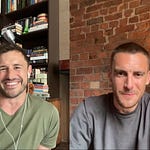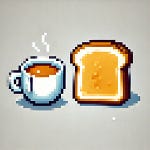Here’s a chat with writer, illustrator and debut author Seth Insua.
Seth’s debut Human, Animal (amazon / independents) is set on a family dairy farm struggling to survive. It follows the fallout from a viral video posted by animal rights activists and the simmering family tensions that bubble over as a result, especially between traditionalist father George and vegan younger son Tom, whose quiet struggle with his gender identity drives much of the plot. The novel further contrasts past and present by including a journal from a German prisoner of war who worked on the farm in the 1940s, and the different perspectives are skilfully juggled throughout.
The book has been out just over a week, has already sold out its initial print run and there are tentative plans for a screen adaptation! Seth is on book tour with events in Newcastle, Glasgow, Bristol, and London and is currently organising his next book projects.
Below you’ll find some notes on the episode (you can get the transcript as well)
Enjoy!
on Human Animal
‘It’s really a story about survival… how we cope with change and how we respond to change.’
The book explores polarisation, around issues like veganism and more intimately through the Calvert family and how they view social change, the importance of tradition and family bonds.
‘They weren’t going to be able to change who they were. So they could either pretend to be something else… or they could find some common ground.’
Insua highlights the family farm dilemma, where small, ethical farms face extinction while factory farms where the business dominates and there is less of a connection to the animals and the natural world thrive:
‘The businesses that are going to survive are the enormous factory farms… The ones that are struggling are the smaller family farms.’
The book’s theme of survival also plays out in ‘the market’ where a kind of Darwinism theoretically holds sway, leaving family farms to fall by the wayside. We see the Calverts struggle to move with the times throughout the novel.
On Writing & Publishing
‘By the time I came to write the book, I had thought about it so much.’
The novel was written quickly (a few months), but the idea had been developing since 2016, with many of the issues brought into relief by the events around Brexit.
Seth wanted to write characters with flaws who remain sympathetic where, ‘Even when they’re making kind of foolish decisions… you can still connect with them’ and we talked about how in a polarised landscape, family dynamics complicate ideological divides:
‘If you do love each other, then it’s harder… You’re forced to find a way through these things [whereas] in a polarised online environment, you just go, ‘Well, you’re dead to me.’
It’s important that the novel’s father character evolves, avoiding the cliché of an unsympathetic, old-fashioned farmer:
“’He finds these things aggravating and confusing, but he is someone who, in his way, is reaching for a solution.’
The biggest structural change in editing was interspersing the prisoner’s journal throughout the main story.
‘Originally, the journals were just a block… It worked much better when we weaved them in.’
The multiple perspectives and time periods interweaving leads to a drip feed of information and a cumulative building of tension that makes the climax far more understandable. A consistent rate of progress makes the story far more compelling for the reader.
On publishing pressures and the challenge of balancing creativity with industry expectations, Seth said:
“You have built a readership with your first book… what you don’t want to do is write something that alienates your initial set of readers.”
“I don’t write in a transactional way… I write because I’m interested in the world around me and I want to make sense of it.”
“Not everything needs to get published… The publishing side of it is the work, but writing should be about what excites you.”
Reading and Influences
Thomas Hardy – Tess of the d’Urbervilles – with its themes of social change, fate, and survival.
‘Hardy was writing at a time when Darwin’s theory of evolution by natural selection had become something that was popular and debated… and he kind of fed that into his plots.’
A Farmer’s Diary – Sally Irwin
A Year on a Dairy Farm – Richard Cornock
The Running Hare – John Lewis-Stempel
German prisoner of war accounts – Used to shape the historical subplot in Human Animal.
Classic & contemporary fiction – A mix of influences, though Hardy remains central.
Bookshops
Seth I mostly based in Newcastle, a city for which I have great fondness, and he recommended a few bookshops for any keen travellers.
Waterstones, Newcastle – A key literary hub in the city where Seth has an event.
Forum Books, Corbridge – A well-regarded independent bookshop outside Newcastle.
The Bound, Whitley Bay – Another independent bookshop where Seth had a launch event and painted the window.
Barter Books, Alnwick – A famous secondhand bookshop in an old train station
find Seth
Human Animal (amazon / independents)
Join me for my next live video in the app















Share this post